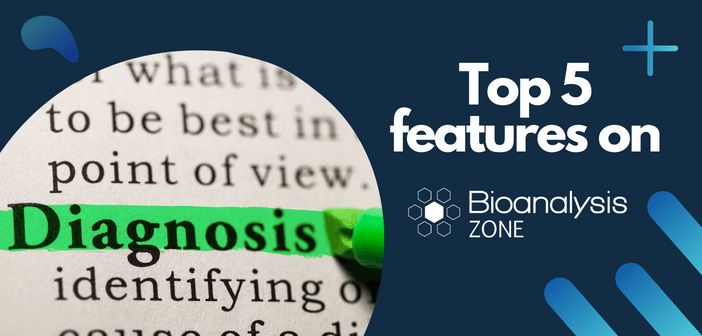Top 5 features on diagnostics

Diagnostics involves the process of determining the nature and circumstances of a diseased condition. While developing novel drugs and therapeutics in order to treat patients, it is crucial to consider individual variability in genes and environment, as it allows medical professionals to predict more accurate treatment and prevention strategies. Precision medicine involves a tailored therapy approach while companion diagnostics are developed alongside a drug aimed to provide information about the safe and effective use of the biological product.
Exploring this field further, we have collated our top content focused on diagnostics, exploring precision medicine and companion diagnostics, to highlight the current research and news.
Development of a national therapeutic drug monitoring programme in childhood cancer in the UK
Our Bioanalysis Rising Star Award winner for 2022, Shelby Barnett, presented her research, developed with her team at the University of Newcastle, on the creation of a nationalized drug monitoring program within the UK for children suffering from cancer.
She goes into detail about how this service is run, how she and her team measure drugs in patient samples and the impact this has had on individual patients and on national treatment guidelines. She also focuses on the investigation of novel sampling approaches and analytical techniques that they are working on to facilitate a higher throughput of patient sample analysis to support a larger infrastructure of TDM.
Jiminy cricket! Locusts discovered to ‘smell’ cancer in humans
One of our top news articles, focused on diagnosis, last year highlighted the discovery from the research team at Michigan State University (MI, USA) that locusts can smell the difference between healthy cells and cancer cells, as well as distinguish the various cancer cell lines in order to aid in the development of devices that can assist with cancer diagnosis.
The research team monitored the insect’s olfactory sensory neurons and were hopeful that an artificial ‘nose’ device could be developed in the future using this study’s findings to accurately and seamlessly detect cancer in patients.
Precision oncology: an interview with Karina Eterovic
Expert Karina Eterovic, from Eurofins Viracor Biopharma (KS, USA), discusses how precision oncology is utilized within the bioanalytical field and how liquid biopsies are used to aid these studies, comparing the differences between early and later diagnosis.
This is a part of our wider in the Zone feature on the clinical development of oncology, where we discuss how PanCancerIQTM supports oncology clinical trial testing and the technological advancements made through the increased focus on precision oncology.
Open wide: biomarkers from a cheek swab may predict rheumatoid arthritis susceptibility
We have also covered the news that researchers from Washington State University and Arthritis Northwest (both WA, USA) had found biomarkers, obtained from cheek swabs, that have the potential to aid in the diagnosis and early treatment of rheumatoid arthritis.
Detecting, diagnosing and treating the condition early enough may cause remission of symptoms, so this discovery could mean early treatment for patients, helping them in the long term with their condition.
Panel discussion: precision medicine and companion diagnostics
In this discussion, our panelists discussed how the current state of precision medicine and companion diagnostics research has come to be and the research trends that have emerged as a result.
They provided insight into how they approach drug development research with a personalized approach and the role of companion diagnostics in this development. They also reviewed the state of current regulations regarding companion diagnostics, in relation to laboratory developed tests.
If you would like to explore more content focused on diagnostics, click the link to find more content on Bioanalysis Zone






